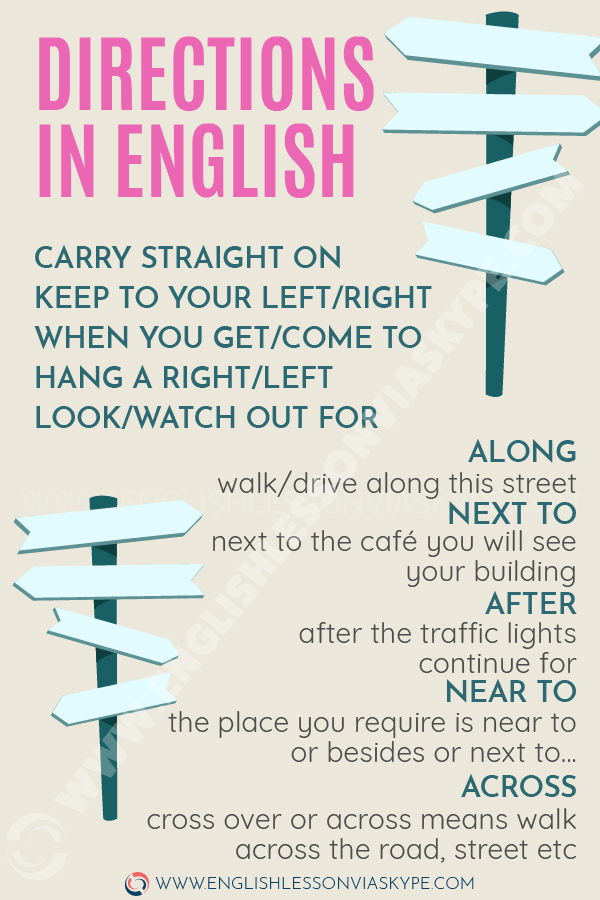Asking for and giving directions is very easy with these useful English prhases and expressions.
Of course, in this day and age many of us prefer to use sat nav or some sort of an app to help us find direction in an unknown place. But as it often happens with technology, even the most sophisticated satellite-navigation system could suffer a network outage.
Scroll down to watch my English video lesson on How to Ask for and Give directions in English.
Harry
How to Give Directions in English

Share and help other students to improve English skills
Being in a strange city or country without directions is very difficult. Understanding the directions you are given or even finding a person able to offer you directions can be even more of a challenge. Here are some common English phrases and words used when GIVING DIRECTIONS in English and also words and phrases useful when ASKING for DIRECTIONS.
Intermediate to Advanced English Marathon

INSANITY: doing the same thing over and over again and expecting different results.
Albert Einstein
- What you'll learn:
- better understanding of more complex grammar structures
- advanced English vocabulary words
- British & American slang
- perfect your listening skills through practing different accents
- This marathon is for you if you're:
- stuck at an intermediate English level
- tired of confusing explanations
- a mature student
- shy & introverted
Giving Directions in English
I get asked by strangers for directions at least twice a week (two times a week). I am not sure why people think I know where every thing is located but even when I have been visiting an unknown city to me I still, strangely, get asked. When I know the city and know the location of where the “stranger” wishes to go (to get to) I try and make my directions as clear as possible. Here is a sample of the common phrases you can use to give directions in English:
- CARRY STRAIGHT ON – this means to continue walking or driving in the same direction. Usually you indicate with your arm or hand.
- KEEP TO YOUR LEFT/RIGHT– This means that you shouldn’t change direction or cross the street.
For example, as you walk along the street keep to your left/right.
- WHEN YOU GET/COME TO – This means when you arrive at a particular place identified (roundabout, traffic lights, crossroads, etc) you have to change direction.
For example, carry on straight [1] along this road , keep to your left [2] when you get to [3] the traffic lights turn left/right.
- HANG A RIGHT/LEFT– Slang word or phrase to mean take a right or left turn.
For example, when you get to the traffic lights hang a right (take the turning right).
- LOOK/WATCH OUT FOR – this usually means to try and identify a certain landmark (important building) like a church or statue, something that is noticeable.
For example: Carry straight on [ 1] along this road, keep to your left [ 2] when you come to [3] the roundabout, take/hang a left [4] at the roundabout and look out for [5] the large statue of the Soldier. You should then see your hotel on the left/right.
Giving directions requires the use of many different prepositions. The common or frequently used prepositions in English are:
ALONG – walk/drive along this street
NEXT TO – next to the café you will see your building
AFTER – after the traffic lights continue for
NEAR TO – the place you require is near to or besides or next to…
ACROSS – cross over or across means walk across the road, street etc
Let’s look at some examples of how we can use different prepositions to give directions in English:
ALONG – Please walk along the street in that direction.
NEXT TO – When you walk along the street you will see a church. It is next to (beside) the ABC Bank.
AFTER – When you pass the bank you will see a DIY shop. After that (the next shop) is the post office. You will find what you need there.
NEAR TO – The post office is near to the city centre.
ACROSS – When you get to the post office you will see the Government office across the street (on the opposite side).
Asking for Directions in English
Asking for directions is certainly the most difficult of these two tasks. Asking a stranger .for help is never easy even when you speak the same language. But it is significantly more difficult when you are trying to ask in his native tongue (English language). Today GPS is available on all our mobile phones but people still like to ask either because they have no signal, no power (battery charge) or simply they just want to practice their English.
There are certain words and expressions in English that you can use to make it easier for you to be understood. These are often indirect questions which are more polite and more likely to give a positive result.
Here are some key opening phrases (initial or phrases to begin with) for you to use when asking for directions in English:
- Excuse me
- May I disturb you
- Sorry for disturbing you
- Could you help me…
2nd part of the phrase or question:
- I was wondering if you could…
- I am looking for…
- But could you direct me to…
- Find my way please…
Asking for Directions in English - Video Lesson
Let’s put them in to a full question or request and practise asking for directions in English:
Excuse me, I was wondering if you could give me some help…
or
Excuse me sir/madam, I was wondering if you could kindly assist me …
I am looking for some directions to my hotel/the city centre. Would you be so kind as to help me?
Sorry for disturbing (sorry to disturb you), but could you direct me to the nearest bank/hotel/police station?
Could you please help me to find my way to the airport/the city centre/ the conference centre.
There are indeed many other English phrases and words and word combinations which can also be used. The
secret ingredient is always to be polite – Excuse me, Sorry to disturb you, Would you mind kindly…
And of course when the advice has been given and the directions have been understood do not forget to offer your thanks. British people use Please and Thank you a lot. They also expect to hear it fronm you when they provide help such as in the situation of giving directions.
Common ways to offer your thanks in English are:
- Thank you
- Thank you so much for your help
- I am really grateful, you have been a great help
I also have a short video lesson about Asking for Directions in English. Please watch and listen to the pronunciation of English words and phrases:
More Information
If you like to improve your English vocabulary further, check out my other posts:
English Expressions about Success
You will love these English lessons

English Idioms related to Dreams
Here you will learn useful English idioms related to dreams. You will also learn the meaning of DREAM ON English


16 Phrasal Verbs with Push
Here you will learn 16 Phrasal Verbs with Push. Watch this short video lesson and learn 4 phrasal verbs. After


14 Phrasal Verbs With Fall With Meanings
In this post you will learn 14 Phrasal Verbs with FALL with meanings and examples. Scroll down to watch a